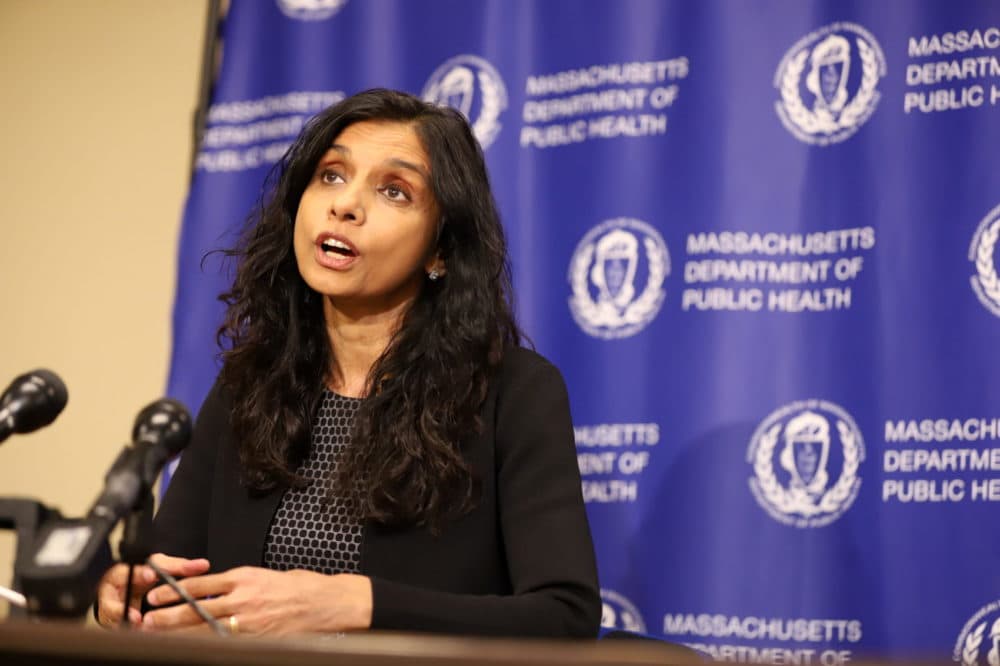Advertisement
Wu taps former state health official to oversee removal of tent encampment

Boston mayor-elect Michelle Wu has chosen a former state health commissioner to lead the city's efforts to deal with the sprawling tent encampment near Massachusetts Avenue and Melnea Cass Boulevard.
Wu has temporarily appointed former Department of Public Health Commissioner Monica Bharel to a senior cabinet level position to help oversee the area where hundreds of people are living on the streets in what the city has described as a "humanitarian crisis."
In a press release, Wu says Bharel will work in the post for the next six months and will "lead the City’s response to urgent public health and housing challenges, including the ongoing public health emergency related to substance use disorder, homelessness, and mental illness, centered around the area known as 'Mass and Cass.' ”
Bharel left her post as DPH commissioner in June after more than six years in that job. At the time, she said she was resigning to pursue other opportunities and would continue to work in health policy with a focus on equity. Bharel also previously worked as a primary care physician.
Wu plans to reappoint Sheila Dillon, the city’s current chief of housing and director of the Department of Neighborhood Development. Dillon will work with Bharel on securing housing options for those living on the streets in the "Mass. and Cass" area. Wu also announced the appointment Dr. Bisola Ojikutu, executive director of the Boston Public Health Commission, to her cabinet to work in an expanded role leading the city’s broader public health efforts.
The city's current health and human services chief, Maty Martinez, has been asked to "support the transition as a senior advisor."
“The humanitarian crisis at Mass and Cass demands urgent, bold solutions that create genuine pathways to recovery and stability for our most vulnerable residents —and we need the right team to get it done,” Wu said.
The appointments come as a lawsuit over removing the tent encampment makes its way through the courts. The suit, filed by the American Civil Liberties Union of Massachusetts and the private law firm WilmerHale, alleges that the city is displacing people without offering appropriate shelter or treatment first, and that the city is unconstitutionally destroying the belongings of those who are moved.
On Tuesday, a single justice of the Massachusetts Supreme Judicial Court held the first hearing on the suit, which asks the court to order a temporary stop to clearing the tents until there is more appropriate housing.
During the hearing, Justice Frank Gaziano asked both sides to outline their positions and asked whether they might be able to reach agreement on their differences. Gaziano said the suit raises several questions about what he called the "complicated topic" of how communities handle the intersection of homelessness, addiction and mental health.
Acting Boston Mayor Kim Janey issued an executive order last month calling for the removal of tents from public ways in Boston. Her administration has said that tents would not be cleared unless alternate housing is offered, along with storage of belongings.
Advertisement
But the suit claims the city is not living up to this promise and is instead telling most people who are displaced to go to nearby homeless shelters. The suit claims many residents can not go to shelters for a variety reasons, such as mental health issues or active drug use.
"We have no doubt the city is working hard to create other kinds of sheltering options precisely because they recognize that the existing ones don't meet the need," said attorney Ruth Bourquin, who argued for the ACLU. "All this is about is saying stop — don't displace those for whom you have reason to know that the shelter is not an appropriate option, it's not practically available to them — until the other options are in place."
More than 300 people are estimated to be living in tents in the area. Attorney Lisa Maki, representing the city at the hearing, said the tents are blocking access to public ways and creating public health and safety issues. She said city officials have to take steps to remove the tents.
"The statistics are dire your honor, " Maki said. "In the past 11 months, there have been six homicides, 22 unattended deaths, 13 sexual assaults and emergency medical teams have responded more than 4,000 times."
Maki also said no one has been charged with disorderly conduct for refusing to comply with the city's order to remove a tent, which is a possible sanction under city rules. She said the city is following protocol to make sure that people are given advance notice before they are asked to remove tents and is working on other shelter options for those who are displaced.
This article was originally published on November 10, 2021.
